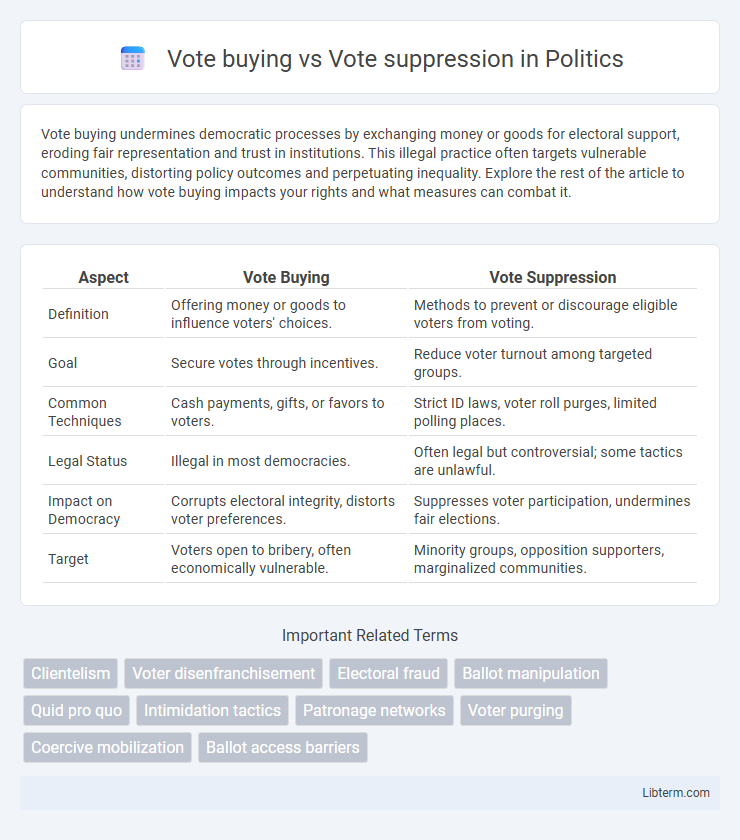Vote buying undermines democratic processes by exchanging money or goods for electoral support, eroding fair representation and trust in institutions. This illegal practice often targets vulnerable communities, distorting policy outcomes and perpetuating inequality. Explore the rest of the article to understand how vote buying impacts your rights and what measures can combat it.
Table of Comparison
| Aspect | Vote Buying | Vote Suppression |
|---|---|---|
| Definition | Offering money or goods to influence voters' choices. | Methods to prevent or discourage eligible voters from voting. |
| Goal | Secure votes through incentives. | Reduce voter turnout among targeted groups. |
| Common Techniques | Cash payments, gifts, or favors to voters. | Strict ID laws, voter roll purges, limited polling places. |
| Legal Status | Illegal in most democracies. | Often legal but controversial; some tactics are unlawful. |
| Impact on Democracy | Corrupts electoral integrity, distorts voter preferences. | Suppresses voter participation, undermines fair elections. |
| Target | Voters open to bribery, often economically vulnerable. | Minority groups, opposition supporters, marginalized communities. |
Introduction: Defining Vote Buying and Vote Suppression
Vote buying involves offering money or goods in exchange for a person's vote, directly undermining the democratic process by influencing voter choice through material incentives. Vote suppression refers to tactics aimed at discouraging or preventing certain groups from voting, such as restrictive voter ID laws, reduced polling places, or misinformation campaigns, which disproportionately affect marginalized communities. Both practices distort electoral outcomes by compromising the fairness and integrity of elections.
Historical Context: Evolution of Electoral Manipulation
Vote buying traces back to ancient democracies where candidates exchanged money or goods for electoral support, ingraining a transactional approach to voting. Vote suppression emerged prominently in the post-Reconstruction United States as legal and extralegal measures, such as literacy tests and intimidation, systematically disenfranchised African American voters. Both practices evolved as strategic tools to manipulate electoral outcomes, reflecting broader struggles for power and control throughout history.
Methods of Vote Buying: Strategies and Tactics
Vote buying involves direct incentives such as cash payments, gifts, or services exchanged for votes, often deployed through networks of local brokers who ensure voter compliance. Strategies include targeted distribution in swing regions, timing disbursements close to election day, and employing subtle coercion to avoid detection. Tactics often leverage socio-economic vulnerabilities, exploiting poverty and lack of political awareness to maximize influence and secure electoral gains.
Techniques of Vote Suppression: Common Approaches
Techniques of vote suppression commonly include strict voter ID laws, purging voter rolls, limiting early voting hours, and closing polling stations in minority or opposition-heavy areas. These approaches disproportionately affect marginalized groups by creating barriers to voting access, resulting in decreased voter turnout. Other methods involve misinformation campaigns and disqualifying absentee ballots, which further undermine electoral participation and fairness.
Motivations Behind Vote Buying and Suppression
Vote buying is primarily motivated by political actors seeking to secure electoral victory through direct incentives, exploiting voters' economic vulnerabilities and immediate material needs. Vote suppression aims to disenfranchise specific groups perceived as opposition supporters, often driven by ideological goals to maintain political dominance or uphold existing power structures. Both tactics reflect strategic efforts to manipulate voter behavior and election outcomes by undermining genuine democratic participation.
Impact on Democracy: Erosion of Electoral Integrity
Vote buying undermines democracy by corrupting the electoral process, eroding voter autonomy, and skewing representation toward those who can financially influence outcomes. Vote suppression disenfranchises marginalized groups, weakening the inclusiveness and fairness essential to democratic legitimacy. Both practices degrade electoral integrity, fostering cynicism and reducing public trust in democratic institutions.
Legal Frameworks and Enforcement Mechanisms
Legal frameworks addressing vote buying and vote suppression vary widely, with many countries imposing strict penalties to deter electoral fraud and protect voter rights. Enforcement mechanisms include election monitoring bodies, independent judiciary oversight, and anti-corruption agencies tasked with investigating and prosecuting violations. Effective legal standards often mandate transparency in campaign financing and provide accessible reporting channels to ensure compliance and enhance electoral integrity.
Case Studies: Examples from Around the World
Vote buying and vote suppression represent distinct forms of electoral manipulation with global case study examples highlighting their impact on democratic processes. In India, vote buying has been documented extensively, where parties offer money or goods to sway voters, undermining fair competition and accountability. Conversely, Zimbabwe exemplifies vote suppression through intimidation and restrictive regulations, effectively disenfranchising opposition supporters and skewing election outcomes.
Combating Vote Buying and Suppression: Effective Solutions
Combating vote buying and vote suppression requires implementing robust electoral transparency measures, including stringent monitoring and enforcement of anti-corruption laws that penalize illicit vote transactions. Enhancing voter education and awareness campaigns empowers citizens to recognize and report coercion or bribery attempts, fostering a culture of electoral integrity. Deploying secure voting technologies and independent oversight bodies ensures free and fair elections by minimizing opportunities for manipulation and intimidation.
Conclusion: Safeguarding Free and Fair Elections
Vote buying and vote suppression both undermine the integrity of elections by distorting voter choices and limiting democratic participation. Effective safeguards include robust legal frameworks, transparent monitoring mechanisms, and voter education campaigns that promote awareness of electoral rights. Ensuring free and fair elections requires coordinated efforts from governments, civil society, and election watchdogs to prevent coercion, fraud, and disenfranchisement.
Vote buying Infographic

 libterm.com
libterm.com